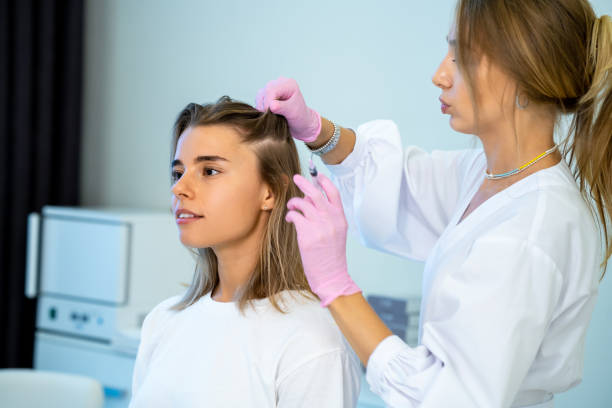
Specialist doing plasmolifting of scalp, stages of baldness, improving condition of hair, bio revitalization of hair skin, vitamins.
In a world where appearance holds significant sway over one’s confidence and self-esteem, the loss of hair can be a profound blow to both men and women alike. Hair is not merely strands of keratin; it is intricately tied to our sense of identity, attractiveness, and overall well-being. Thus, the emergence of hair restoration services has not only addressed a physical concern but has also had a profound impact on the mental and emotional health of individuals experiencing hair restoration. This article delves into the multifaceted ways in which hair restoration services contribute to enhancing well-being.
The Psychological Toll of Hair Loss
Hair loss, whether gradual or sudden, can evoke a range of emotions, from frustration and embarrassment to anxiety and depression. Society often associates a full head of hair with vitality, youthfulness, and attractiveness, leading individuals experiencing hair loss to grapple with feelings of inadequacy and diminished self-worth.
Research indicates a significant correlation between hair loss and psychological distress. A study published in the Journal of the American Academy of Dermatology found that individuals with androgenetic alopecia, the most common form of hair loss, experienced higher levels of anxiety and depression compared to those with a full head of hair. Moreover, the psychological impact of hair loss extends beyond mere vanity; it can affect social interactions, professional opportunities, and overall quality of life.
The Rise of Hair Restoration Services
Fortunately, advancements in medical technology have paved the way for innovative solutions to combat hair loss and restore confidence. Hair restoration services encompass a spectrum of treatments tailored to individual needs, ranging from non-invasive procedures such as topical solutions and laser therapy to surgical interventions like hair transplants.
One of the most widely sought-after hair restoration techniques is follicular unit transplantation (FUT) or follicular unit extraction (FUE), which involves harvesting hair follicles from donor sites and implanting them into balding or thinning areas. These procedures offer natural-looking results with minimal scarring, providing a long-lasting solution to hair loss.
Enhancing Self-Esteem and Confidence
Beyond its physical benefits, undergoing hair restoration near me can have a transformative effect on one’s self-esteem and confidence. Restoring a full head of hair can instill a newfound sense of youthfulness and attractiveness, allowing individuals to present themselves with greater assurance and poise.
Research conducted by the International Society of Hair Restoration Surgery (ISHRS) indicates a significant improvement in self-esteem following hair restoration procedures. In a survey of patients who underwent hair transplantation, over 90% reported a positive change in their self-image, with many expressing newfound confidence in social and professional settings.
Psychosocial Benefits
The impact of hair restoration extends beyond individual well-being to encompass broader psychosocial benefits. Feeling satisfied with one’s appearance can foster stronger interpersonal relationships, as individuals are more likely to engage confidently in social interactions and form meaningful connections.
Moreover, the psychological benefits of hair restoration can extend to professional success. Research suggests that individuals perceived as more attractive are often perceived as more competent and trustworthy, leading to potential advancements in career opportunities and earning potential.
A Holistic Approach to Well-Being
While hair restoration services offer a valuable solution to hair loss, achieving holistic well-being entails addressing underlying psychological factors associated with body image and self-esteem. Counseling and support groups can provide individuals with the tools to navigate the emotional challenges of hair loss and cultivate resilience.
Additionally, adopting lifestyle habits that promote hair health, such as maintaining a balanced diet, managing stress, and avoiding excessive heat and chemical exposure, can complement the effects of hair restoration treatments and support long-term well-being.
Conclusion
Hair restoration services represent more than just a cosmetic solution to hair loss; they offer a pathway to enhanced well-being and confidence. By addressing the psychological impact of hair loss and restoring a sense of self-esteem, these services empower individuals to embrace their appearance and live life to the fullest. As the stigma surrounding hair loss continues to diminish, the transformative potential of hair restoration in promoting mental and emotional health becomes increasingly evident. Ultimately, unlocking confidence through hair restoration services signifies not only a physical transformation but also a journey towards reclaiming one’s sense of identity and self-worth.





